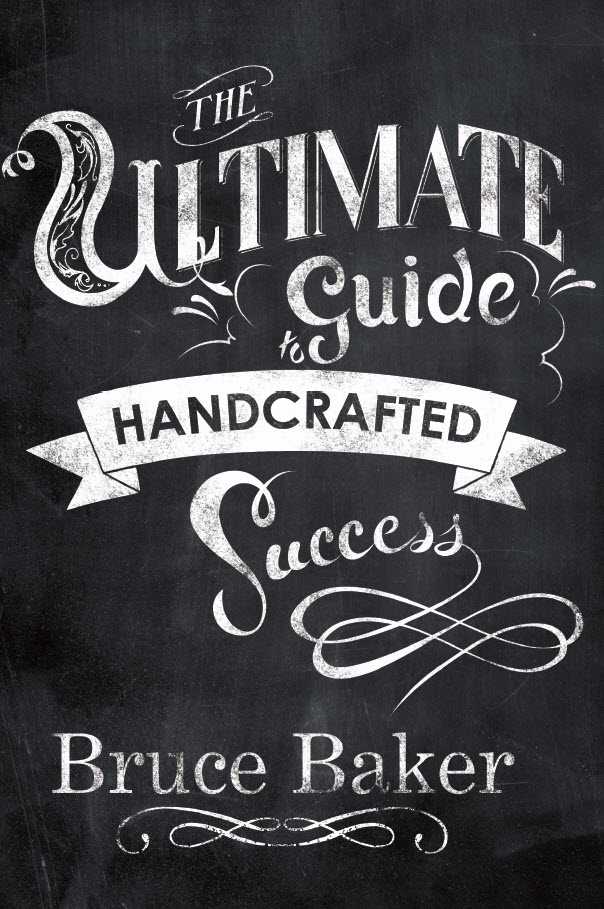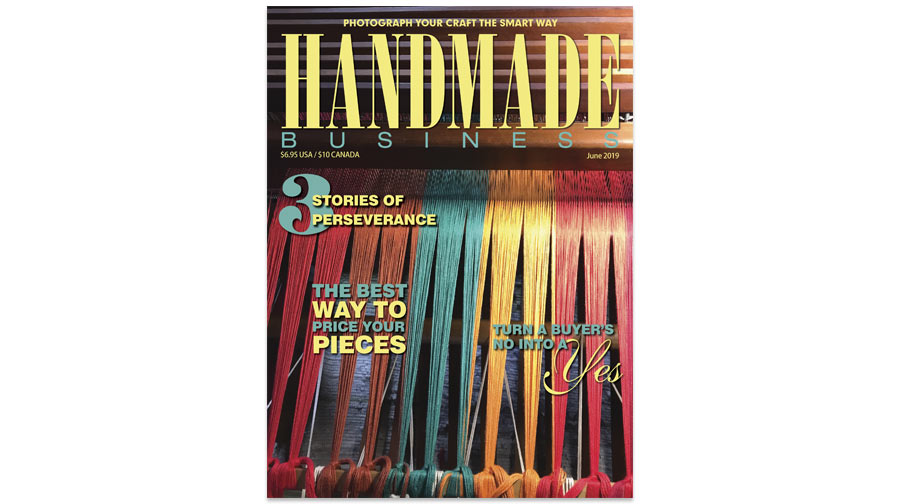Okay, here’s an experiment: Pick up a musical instrument you’ve never played before. Now go stand onstage at Carnegie Hall and give a concert.
Ha ha. Pretty funny, eh? And unrealistic, of course. No one in their right mind would expect to give a concert without years of practice under their belt.
Yet this is exactly what some people have in mind for a craft business: instant success. One craft show and you’re established forever. Word will spread like wildfire. People will flock to your booth and spend money like water. You’ll never have to return to your nine-to-five job again. Ta-da!
It’s far too easy to look at a successful crafter and assume that you, too, can achieve that level of success. But here’s the thing: you can. Remember, the crafter you admire did not achieve that level of success immediately. Nor will you. And never forget the far greater number of crafters you can’t see, because they’re no longer in business.
We run a home craft business. It’s our sole source of income. We work at home. We don’t have to commute. We get to see our kids all the time. We’re living the American dream, everyone’s fantasy lifestyle. (Right.)
Gosh darn, aren’t we lucky.
NOT.
The harder I work, the luckier I get
I admit I get a little offended when people attribute our current circumstances to luck. Luck implies that we haven’t done anything to get to where we are. In other words, luck implies that our present situation has nothing to do with our past sacrifices. And boy, did we sacrifice. We still do.
A successful craft business is a mixture of several things: sound business sense, sheer hard work and good preparation. Most of all, a successful craft business needs to sell a unique product that fills a niche or, even more creatively, make the niche to sell the product (pet rocks, anyone?).
In other words, no successful crafter has done the equivalent of booking a concert in Carnegie Hall on a new instrument. But it doesn’t hurt to keep Carnegie Hall in mind when embarking on your craft business.
Of course you’re going into business because you have high expectations of success. There’s nothing wrong with that. (What would be the opposite—that you went into business with the expectation of failing?)
However, temper your expectations with a huge dose of reality. Your product is in competition with every other booth at the craft fair, with every other Web page on the Internet, with every other business out there that is vying for the customer’s dollar. It’s up to you to garner the patience to keep improving your product, your pricing, your exposure, your market, your wholesalers or whatever other means you utilize to increase business. And this all takes time.
 Patience and foresight
Patience and foresight
When you look at that successful crafter you admire, don’t assume they somehow sprang into being effortlessly. When you see a thriving production, all you see is the “snapshot” of the here and now, and you might grow envious that those people are living the (ahem) good life. What you don’t see are the blood, sweat, tears, financial uncertainty, gnawing anxiety and other unpleasant side effects of starting a home craft business. A thriving home business has gone through these stages, and it’s unfair to envy their success just because your business is at the beginning of its growth pains. Be patient.
The patience is obvious, but where does the foresight come in? You need foresight to be able to project ahead, sometimes far ahead. This is a highly unappreciated skill and one you should practice regularly. Nearly any business decision you make will have an impact on your future.
If you annoy the craft coordinator of a local craft show, you may not realize that he probably knows and might mention you to the craft coordinator of a larger show, who will then mention you to yet another craft coordinator, and so on up the chain. You could find yourself blacklisted.
Alternately, if you prove to be an ideal vendor at a local craft show (non-complaining, helpful, complimentary, prompt, self-sufficient, etc.), then not only will you be invited back the following year, but your reputation may (and almost certainly will) spread to larger events. Everything is a chain reaction.
Or let’s say you need a new table saw because your old one is on its last gasp. Do you splurge on the finest table saw money can buy, putting it on your credit card and tossing the dying saw in the scrap heap? Or do you nurse your old saw along for another month or two while you save up the money and pay cash for the best saw you can afford? If something glitches in the economy and your business slows down, which route will give you greater peace of mind? And which route is more likely to lead to your survival as a business?
So think about the future impacts of your current decisions. Ask yourself, “Will this improve my business next week, next month, next year, next decade?”
Work hard
Long hours are another unappreciated factor in the success of a business. “It takes time” is a statement that not only applies to the number of years it takes a business to get off the ground, but also the number of hours in a day you put into working to make that business succeed.
Consider this: when you’re off having a good time on weekends and holidays, we’re usually working. Last New Year’s Eve, for example, my father called around 9 p.m. to wish us a happy New Year, and asked what we were doing.
“Working,” I replied, and it was true. My husband and I had put the children to bed and were sitting at the kitchen table, working through yet another production run while most of the Western world was off partying.
That’s what you have to do to succeed. You need to work hard, work consistently, work even when you don’t feel like working.
Build your reputation
We have a booth at the Kansas City Renaissance Festival, where we sell our handcrafted hardwood drinking tankards. The event runs every weekend from about the beginning of September through mid-October.
It is, without question, our single best event of the year. We have a husband/wife team who manages the booth for us, and they are among the finest salespeople you’ll ever meet. For a giddy period of six or seven weeks, we sell our product in dizzying quantities.
Yes, we sell well at KC. But once again, what you’re seeing is the snapshot of our current success.
The reason we sell so well is that we’ve been there so many years and because our booth managers work their fannies off. The behind-the-scenes picture you’re not seeing is how long it took us to find our wonderful booth managers, how high the booth fee is, the taxes we have to pay to the state of Kansas, the hideously long hours we work during our busy season to supply them with enough stock to keep the shelves full, and on and on and on. This also doesn’t count the elusive things we work hard to maintain, such as high standards of quality, a handsome booth and our reputation as solid, dependable craftspeople. Whew.
So please don’t gripe that we’re successful, because you’re seeing a snapshot of the successful side we’re showing to the world. We’ve earned it.
Your turn
Now it’s your turn to examine your product, your production methods and your business practices to make sure you’re maximizing your ability to earn money from your craft.
What can you do to streamline your techniques? What can you improve in your salesmanship at craft shows? How can you display your products more attractively?
Half or more of your potential success isn’t so much a matter of product as it is a matter of management. Remember, good things come to those who wait. Oh, and to those who work their fannies off in the meantime.
Patrice Lewis is a wife, mother, homesteader, homeschooler, author, blogger, columnist, and speaker. An advocate of simple living and self-sufficiency, she has practiced and written about self-reliance and preparedness for almost 30 years. She is experienced in homestead animal husbandry and small-scale dairy production, food preservation and canning, country relocation, home-based businesses, homeschooling, personal money management, and food self-sufficiency. She and her husband have been married since 1990 and have two daughters.






